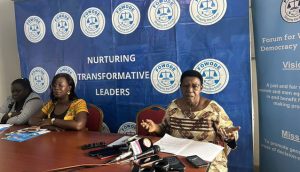Women activists have expressed concern about the rise in Gender-Based Violence (GBV) and child marriages, as well as corruption, and have advocated for strengthening the capacity of key institutions to combat the vice in Uganda.
While addressing journalists at the Forum for Women in Democracy (FOWODE) headquarters in Ntinda on November 22, 2023, Miria Matembe, a women’s rights activist, noted the discouraging trend of gender-based violence, which undermines the hard-fought efforts initiated by pioneers like the late Joyce Mpanga.
Matembe emphasised the harmful practice of marrying off young girls, particularly in districts such as Ssembabule, Lyantonde, and Kiruhura, often in exchange for cattle, a practice she had previously fought against.
She also expressed concern about corruption, stating that due to limited resources, women are frequently coerced into sexual exchanges.
“Women are often coerced into sexual exchanges for jobs or favours due to their limited resources, hampering their ability to contribute to national and family development,” Matembe said.
She noted that, despite increased female representation in decision-making positions, the situation appears to be regressing, with worsening gender-based violence conditions.
FOWODE’s Director of Programmes, Elizabeth Ampairwe, emphasised the prevalence of GBV in Uganda, which has a significant impact on women and girls.
She cited figures from the 2022 police report that show alarming figures: 17,698 cases of domestic violence, 1,623 cases of rape, 8,960 cases of defilement, and 14,693 sex-related cases.
Ampairwe expressed concern about the frustratingly low prosecution rates, indicating that GBV survivors have limited access to justice.
She urged the government, specifically the Ministry of Gender, Labour, and Social Development, to prioritise recruiting staff for local governments’ community-based services departments. This, she argued, would significantly aid citizen mobilisation and combat negative cultural practices and societal attitudes.
Ampairwe also advocated for strengthening the capacity of key institutions dedicated to GBV prevention, such as the police’s Child and Family Protection Unit and the Office of the Director of Public Prosecutions. She believes that strengthening these institutions is critical to effectively addressing and mitigating cases of gender-based violence in Uganda.
In 2022, only 7.8 percent of domestic violence cases reached court, and merely 1.1 percent resulted in conviction.


